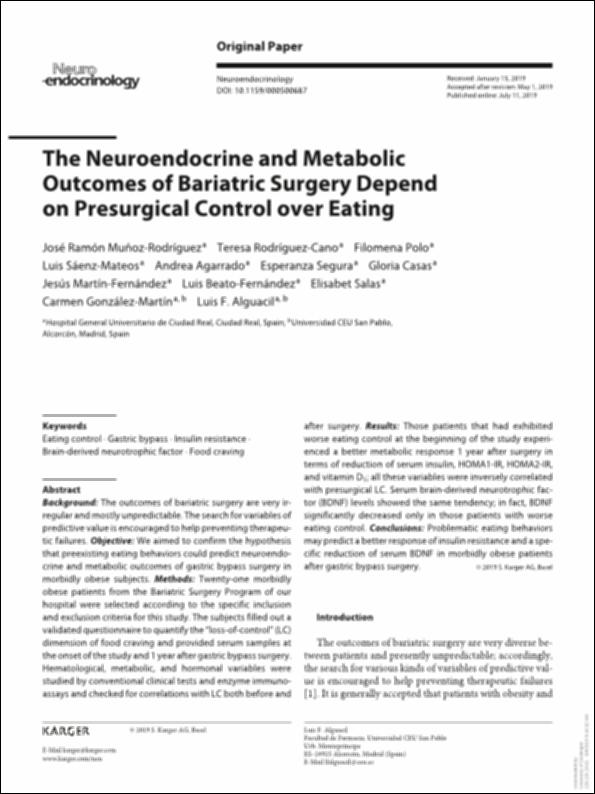Please use this identifier to cite or link to this item:
http://hdl.handle.net/10637/15361The neuroendocrine and metabolic outcomes of bariatric surgery depend on presurgical control over eating
| Title: | The neuroendocrine and metabolic outcomes of bariatric surgery depend on presurgical control over eating |
| Authors : | Muñoz Rodríguez, José Ramón Rodríguez Cano, Teresa Polo, Filomena Sáenz Mateos, Luis Agarrado, Andrea Segura, Esperanza Casas, Gloria Martín Fernández, Jesús Beato Fernández, Luis Salas, Elisabet González Martín, Carmen Alguacil Merino, Luis Fernando |
| Keywords: | Brain-derived neurotrophic factor; Eating control; Food craving; Gastric bypass; Insulin resistance |
| Publisher: | Karger Publishers |
| Citation: | Muñoz-Rodríguez JR, Rodríguez-Cano T, Polo F, Sáenz-Mateos L, Agarrado A, Segura E, Casas G, Martín-Fernández J, Beato-Fernández L, Salas E, González-Martín C, Alguacil LF. The Neuroendocrine and Metabolic Outcomes of Bariatric Surgery Depend on Presurgical Control over Eating. Neuroendocrinology. 2020;110(1-2):63-69. doi: 10.1159/000500687. |
| Abstract: | Background: The outcomes of bariatric surgery are very irregular and mostly unpredictable. The search for variables of predictive value is encouraged to help preventing therapeutic failures. Objective: We aimed to confirm the hypothesis that preexisting eating behaviors could predict neuroendocrine and metabolic outcomes of gastric bypass surgery in morbidly obese subjects. Methods: Twenty-one morbidly obese patients from the Bariatric Surgery Program of our hospital were selected according to the specific inclusion and exclusion criteria for this study. The subjects filled out a validated questionnaire to quantify the "loss-of-control" (LC) dimension of food craving and provided serum samples at the onset of the study and 1 year after gastric bypass surgery. Hematological, metabolic, and hormonal variables were studied by conventional clinical tests and enzyme immunoassays and checked for correlations with LC both before and after surgery. Results: Those patients that had exhibited worse eating control at the beginning of the study experienced a better metabolic response 1 year after surgery in terms of reduction of serum insulin, HOMA1-IR, HOMA2-IR, and vitamin D1; all these variables were inversely correlated with presurgical LC. Serum brain-derived neurotrophic factor (BDNF) levels showed the same tendency; in fact, BDNF significantly decreased only in those patients with worse eating control. Conclusions: Problematic eating behaviors may predict a better response of insulin resistance and a specific reduction of serum BDNF in morbidly obese patients after gastric bypass surgery. |
| URI: | http://hdl.handle.net/10637/15361 |
| Rights : | http://creativecommons.org/licenses/by-nc-nd/4.0/deed.es |
| ISSN: | 1423-0194 |
| Issue Date: | 2020 |
| Center : | Universidad San Pablo-CEU |
| Appears in Collections: | Facultad de Farmacia |
Items in DSpace are protected by copyright, with all rights reserved, unless otherwise indicated.


